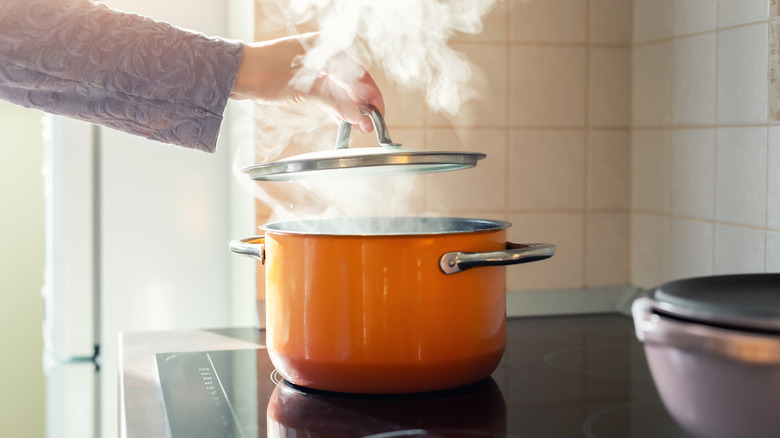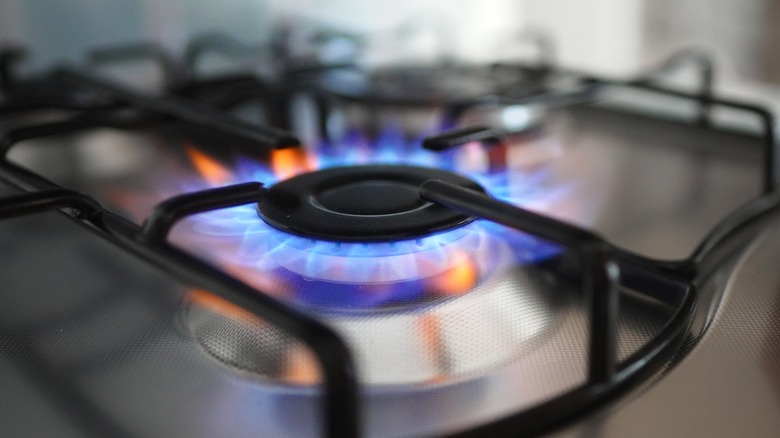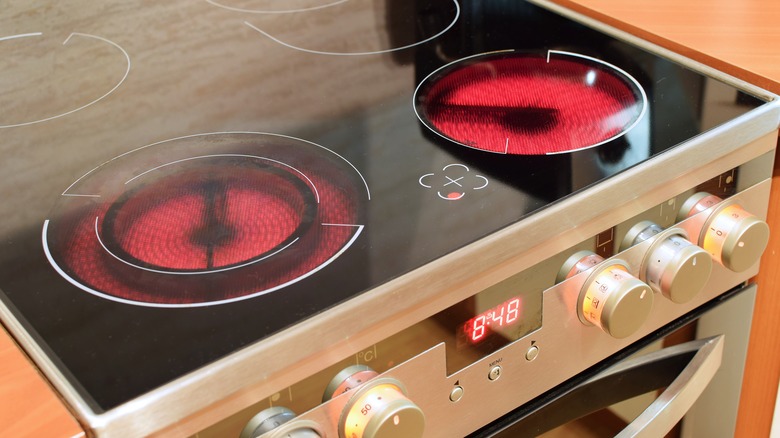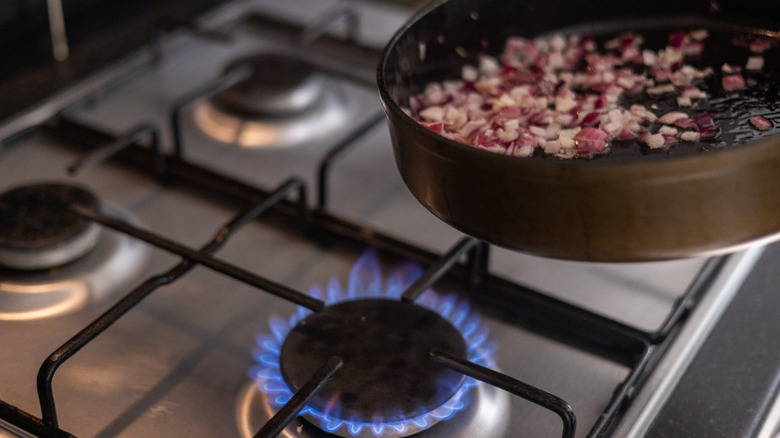Electric Vs Gas Stoves: Which Are Best?
Our days, essentially, revolve around mealtimes, and each of us has a distinct approach to them. Some might skip breakfast or lunch entirely, while others would never dream of doing such a thing. Some cook elaborate meals, while others' culinary efforts barely extend beyond takeout menus and the simple heating of ready-prepared meals.
Regardless of our eating habits, though, it's almost inevitable that we'll wind up spending a considerable amount of time in the kitchen over the course of our lives. In the U.S., that's an average of 400 hours every year, according to a Bosch Home Appliances and OnePoll survey (via Zenger). With that in mind, then, the crucial appliances of your kitchen require considerable thought to ensure they'll meet your needs. One major question you might have is this: Would a gas or electric stove be better?
It's a nuanced question, as each option has its distinct qualities, advantages, and disadvantages. Let's break it down into some key aspects of the debate to reach a conclusion.
Costs
For those who aren't the most discerning of cooks, the most pressing factor to consider might not be a culinary one at all. It might simply be the very logical and practical question: Which type of stove, generally, is more costly?
Fixr reports that, in the case of a stove of otherwise identical dimensions, fitting an electric stove is rather cheaper than fitting a gas one (up to around $700 for the former compared to up to $1,260 for the latter). Of course, prices will vary greatly depending on where you live, the manufacturer you choose, and so on, but the installation of a gas stove, which naturally requires a gas line, can be more complicated and so more expensive. The option isn't as widely available either.
In the longer-term, though, running costs become more significant than initial installation outlay. The price of using an everyday center point of a kitchen like a stove, after all, is sure to mount quickly. ElectricRate estimates that working from an average hour of use on a daily basis, a gas stove will cost $7.50 for a month's usage, or $90 per year. For an electric device, it's $11 per month and $132 per year. Over the course of a full decade, then, this would mean that it would be approximately $420 cheaper to use a gas stove.
With usage cases, utility costs, and other factors differing so much, though, it's impossible to give an exact, non-generalized comparison, and it isn't necessarily always cheaper.
Your specific cooking habits
It can be the case, then, that gas stoves can be more expensive to install but users will save on the running costs. It follows, then, that those who cook a lot stand to save more. Another of the most important factors in your decision is just that: how often do you plan to cook using your stove, and what kinds of things are you likely to be cooking?
The Washington Post states that Consumer Reports deems electric stoves to be more generally effective at maintaining particular levels of heat, though they can be less able to provide nuanced changes in temperature where required. Where a meal requires running the gamut from a light simmer to a fierce boil, gas can segue from one to the other more smoothly, while also providing, as chef Jon Kung put it to The Guardian, "visual and tactile" information that conventional electric models lack.
Perhaps, then, an electric model can be a great fit for those who tend to prepare packaged foods that simply require pre-heating and then cooking at a given temperature for a given period of time. The more precise control sometimes required by elaborate dish-preparers could be considered more the domain of gas stoves.
Cleveland chef Doug Katz told Cleveland.com that they consider it "more fun to cook when I can see a flame underneath my pot, and I think it allows for more precise and intentional cooking for me and my team of chefs."
Maintenance
As crucial as balanced meals can be to our health, it's unfortunately true that the time to prepare them can be difficult to come by, with the pressures of work, family, and our generally high-octane lives. It's not just meal preparation, either — the inevitable clean-up afterward has to be factored into the equation, too. It's really not surprising that, in 2022, over 1.7 billion DoorDash orders were made, according to Statista data.
The comparison between electric and gas stoves, then, is about more than just their technical performance. Another element of the debate is how much work they require outside of cooking itself. When it comes to cleaning, many electric stovetops lack the complex components of their gas counterparts, allowing cleaning wipes to glide across the cooking surface to prevent any build-up from spillages.
By contrast, the gas connection, gas burners, and protective grates of a gas stove may need to be detached and cleaned separately, and not doing so carefully risks damage to delicate components, as HomeClean's Andrii Gurskyi told Reader's Digest.
In addition to this, those who power their gas stoves using propane supplies because of limited access face additional steps and complexity to use.
The environment and other potential risks
Gas stoves, of course, are powered by gas. This will typically be natural gas, though propane is commonly used in the case of "barbecues, camping stoves and food trucks," Feasting at Home's Sylvia Fountaine tells Livestrong. Portable stove options for the likes of camper vans are varied, too. With electrical power being widely considered a more environmentally-friendly option (though the carbon footprint of the likes of electric vehicles can be surprising), it's important to consider the impact of gas stoves.
The October 2022 study "Composition, Emissions, and Air Quality Impacts of Hazardous Air Pollutants in Unburned Natural Gas from Residential Stoves in California," by Eric D. Lebel et al (ACS Publications), concluded that gas leaking from such stoves, even when switched off, can lead to "indoor benzene concentrations ... comparable to environmental tobacco smoke."
John Barker of the Ohio Restaurant Association told Cleveland.com that while gas stoves are commonly used in business restaurant kitchens for their versatility and speed, such "commercial kitchens also have extensive ventilation systems maintained in accordance with Ohio code."
In a home setting, such ventilation isn't generally accessible, and gas leaks can pose considerable dangers. With electric stoves, there's another big concern to consider: fires. In September 2023, the National Fire Protection Association issued research titled "Home Cooking Fires," which stated that, for every one million homes, injuries by fire were 3.6 times more likely for those that used electric rather than gas stoves.
The complex picture
Gas is a reliable, speedy, versatile option, and one that won't let you down if you find yourself in the midst of a power failure. By virtue of its connections, though, it's rather unwieldy and is all but set in place once installed. Electric stoves tend to be rather more convenient in a plug-and-go sense, and magnetic-field-powered induction ovens are potentially safer because they don't heat a specific area of the oven itself. They are, of course, reliant on a constant electrical supply to function, and can potentially cause fires.
Fears like gas emissions, and a preference for greener, healthier cooking, can lead consumers to pick the electric option. The December 2022 study "Population Attributable Fraction of Gas Stoves and Childhood Asthma in the United States," by Talor Gruenwald et al (MDPI) concluded that "12.7% of current childhood asthma in the U.S. is attributable to gas stove use."
Nonetheless, simple steps such as installing air purifiers with appropriate CADRs can lessen these dangers. Where permitted — in May 2023, New York announced that a ban on gas stoves in new buildings less than seven stories in height would come into force by 2026 — they remain a viable option.
Ultimately, it seems that there's no simple answer as to whether gas stoves are better than electric ones. The thing to consider, above all, is which option is more practical for your household situation.





